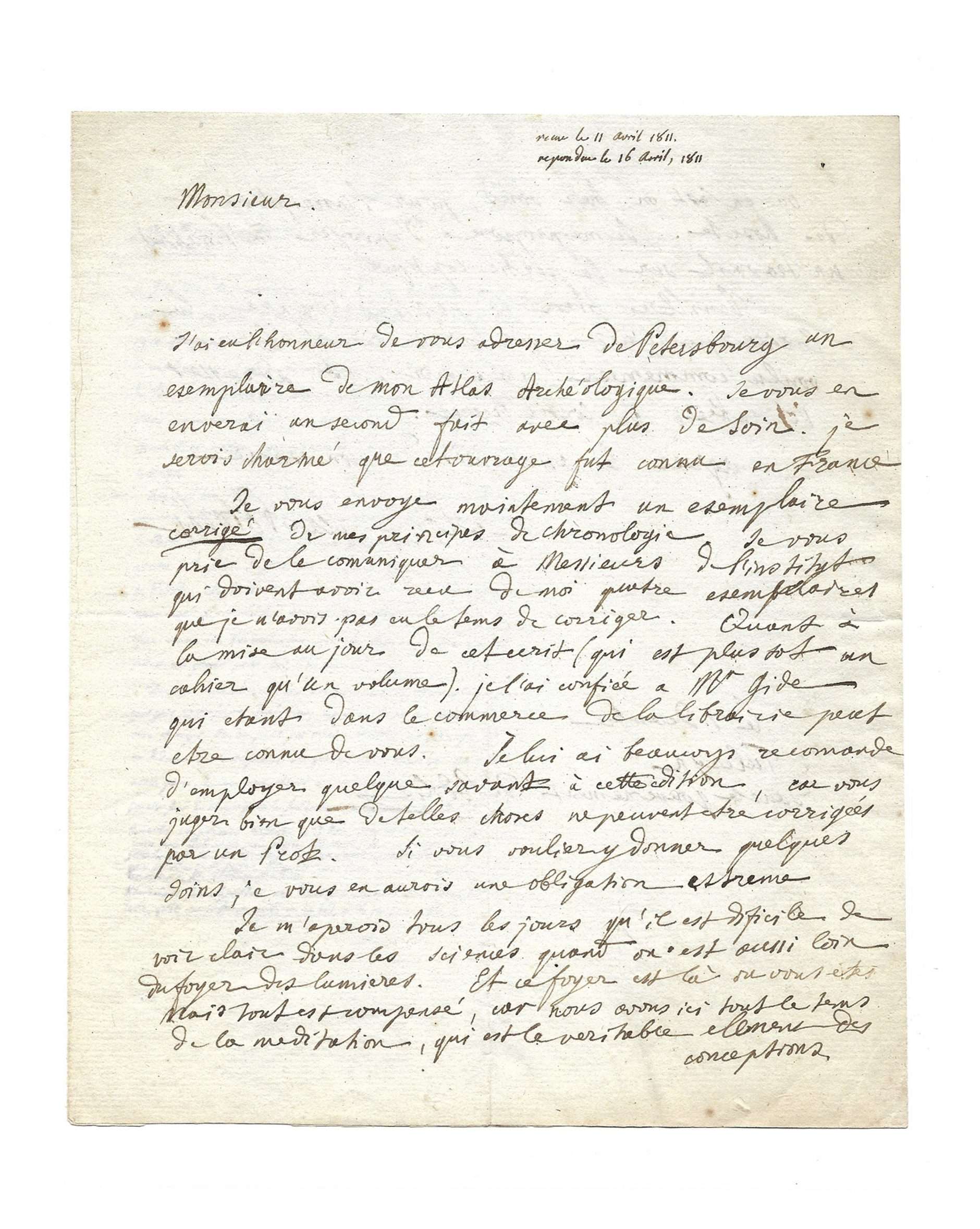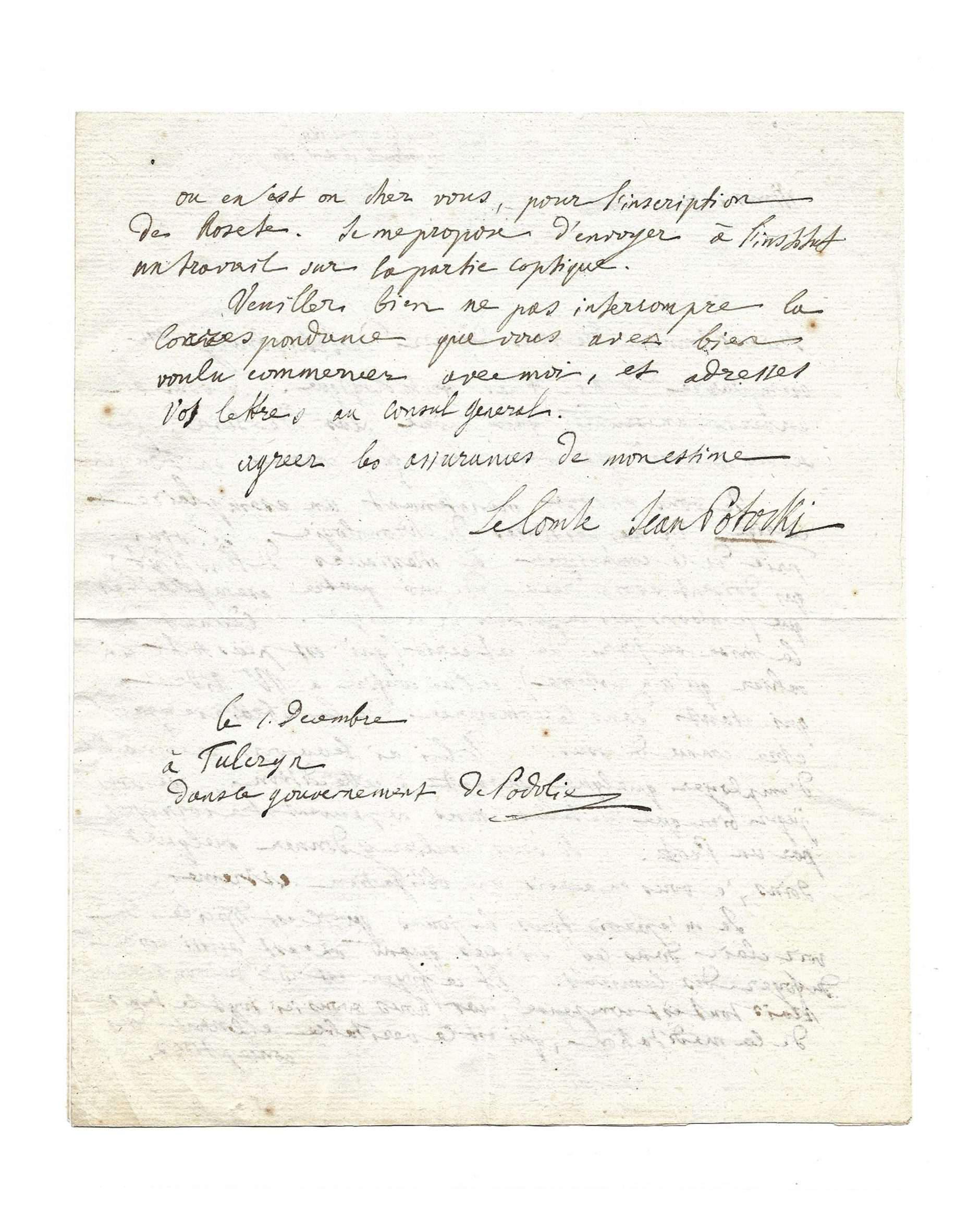POTOCKI, Jean (1761-1815)
Autograph letter signed « Jean Potocki » to Firmin Didot
Tulczyn, 1st December [1810], 1 1/4 p. in-4°
« I realize every day that it is difficult to see clearly in science when you are so far from the home of the enlightenment »
Fact sheet
POTOCKI, Jean (1761-1815)
Autograph letter signed « Jean Potocki » to Firmin Didot
Tulczyn in Polody [Russian province after the Second Partition of Poland in 1793] , 1st December [1810], 1 1/4 p. in-4°
Autograph note by Firmin Didot upper margin : « Reçue le 11 avril 1811 / répondue le 16 avril, 1811 »
Slight browning and tiny spots
Remarkable letter in which Jean Potocki sends his last works to his printer, while reminding him of his concern for accuracy prior to their publication
« Monsieur,
J’ai eu l’honneur de vous adresser de Petersbourg un exemplaire de mon Atlas Archéologique. Je vous en enverai un second fait avec plus de soin. Je seroi charmé que cet ouvrage fut connu en France.
Je vous envoye maintenant un exemplaire corrigé de mes principes de Chronologie. Je vous prie de le comuniquer à Messieurs de l’institut qui doivent avoir recu de moi quatre exemplaires que je n’avois pas eu le tems de corriger(1). Quant à la mise au jour de cet ecrit (qui est plustot un cahier qu’un volume), je l’ai confiée à Mr Gide(2) qui etant dans le commerce de la librairie peut etre connu de vous. Je lui ai beaucoup recommande d’employer quelque savant à cette édition, car vous jugez bien que de telles choses ne peuvent etre corrigées par un Prot. Si vous vouliez y donner quelques soins je vous en aurois une obligation extreme.
Je m’aper[ç]ois tout les jours qu’il est difficile de voir clair dans les sciences quand on est aussi loin du foyer des lumieres. Et ce foyer est là ou vous etes. Mais tout est compensé, car nous avons ici tout le tems de la meditation, qui est le veritable element des conceptions.
Ou en est on chez vous, pour l’inscription de Rosete. Je me propose d’envoyer à l’institut un travail sur la partie coptique(3).
Veuillez bien ne pas interrompre la correspondance que vous aves bien voulu commencer avec moi, et adresses vos lettres au Consul General.
Agreez les assurances de mon estime
Le Comte Jean Potocki
Ce 1. Decembre
A Tulczyn
dans le gouvernement de Podolie »
[1] On August 17, 1810, Potocki had sent his Principes de chronologie pour les temps antérieurs aux Olympiades to the Institute of France: “I have the honor to send you the result of my research on the ancient Chronology […] I am convinced that, through the errors of the writing, your indulgence will easily unravel the obvious marks of obstinate work” (letter now preserved by the Österreichische National Bib. In Vienna).
[2] Théophile Étienne Gide (1768-1837), printer. In 1813 and 1814 he edited fragments of The Manuscript found in Saragossa.
[3] The Rosetta Stone was discovered in 1799. His work on the “coptic part” has not been found.
An eclectic character, whose talent is not limited to literary qualities, Potocki’s many travels have made him a historian, archaeologist, geopolitical scientist, ethnologist and linguist. Two works crown his genius: L’Atlas archéologique de la Russie européenne (1797-1805) and The Manuscript found in Saragossa (several French versions between 1797 and 1811, two partial sets of non-commercial cupboards printed in St. Petersburg in 1804-1805, two partial versions published in Paris in 1813 and 1814).
The Atlas, which we are talking about here, is similar to what we now call a historical atlas, that is, the historical and geopolitical evolution of a geographical area through maps. Its author sees this project as an ultimate goal
Jean Potocki : chronograph
The chronology of antiquity appears as a logical continuation of his research as a historian of antiquity and his scholarly readings. To find his way around, Jean Potocki needs to deal with synchrony: these are his “cyclographic maps”, and diachrony: it will be his “chronologies”, which will constitute the essence of his research, once installed in his studious and solitary retreat of Uladowka. It is from 1803 that he undertakes a new work on the chronology of ancient periods: Principes de chronologie pour les temps antérieurs aux Olympiades (six volumes published from 1813 to 1815) which is also mentioned in this letter.
We attach:
A long autograph [draft] letter from Firmin Didot to Jean Potocki, who crossed that of the latter (supra), sent six weeks earlier
Paris, 30 January 1811 – 2 p. in-12°, in very tight writing
“Your research is very luminous and in general throws a great light on history”
« […] Vous m’avez fait l’honneur de m’adresser ainsi que le rouleau qui l’accompagnoit et qui renfermoit la 2eme edition de Votre Atlas historique […] Votre Atlas e[s]t intéressant la Carte m’en paroit bien faite, et quelque jours nous la ferons graver à la suite de plusieurs de vos ouvrages, tels que l’histoire ancienne de Podolie, celle de Wolhynie et en general de tout ce que vous avez ecrit sur l’ancienne histoire de la Russie, qui n’est pas assez connue ici. Vos recherches sont très lumineuses et en général jettent un grand jour sur l’histoire […] Didot then raises small historical objections to the Principles of Chronology of his correspondent, thus testifying to the publisher’s devoted attachment to the writer’s work.
Is it necessary to recall the utmost rarity of Jean Potocki’s autograph letters?
Of the 199 letters recorded in the correspondence, only three are in private hands, including this one.
Bibliography:
Œuvres V, éd. F. Rosset & D. Triaire, Peeters, n°178
Provenance:
Private collection



